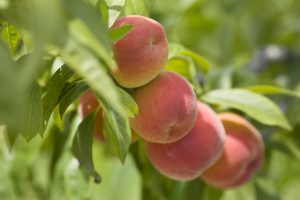By Breanna Kendrick

MP-29 is a hybrid plum-peach rootstock that was created to give peach growers another weapon in the disease-fighting toolbox.
Tom Beckman, a U.S. Department of Agriculture research horticulturist, discussed MP-29 at the recent Stone Fruit Field Day in Citra, Florida. MP-29 is the most recent rootstock release from Beckman’s breeding program.
Beckman created MP-29 because growers needed resistance to Armillaria root rot, and he wasn’t finding resistance in the peach rootstock germplasm that was available. “I went to plums because I knew resistance was likely there given the enormous diversity available in plums as compared to peaches,” said Beckman. According to the researcher, MP-29 has exceptional resistance to Armillaria root rot and offers resistance to other diseases as well.
“What we ended up with in the case of MP-29 was a piece of material that was every bit as good as Guardian (rootstock) for peach tree short life,” said Beckman. “MP-29 is as good as any rootstock for root-knot nematodes.” He added that MP-29 appears to be resistant to Meloidogyne incognita, M. javanica and M. floridensis nematodes.
According to Beckman, Georgia and South Carolina’s old peach production areas commonly experience both short life and Armillaria, so a rootstock resistant to both is ideal. “This is a big step forward for us. The hope is that this (MP-29) can go further afield, but you don’t take a material like this and throw it into an entirely different climate and soils and expect it to shine,” said Beckman. Although he said MP-29 has been commercially available for five years, there has not been a lot of it hitting the market. “I’ve been cautioning people … we’ve had some nursery production issues with it.”
There isn’t a lot of data on MP-29’s nursery performance, and nurseries have had to learn how to handle and produce a finished tree on MP-29. “It does not just plug into the production protocol typically used for seed propagated rootstocks like Guardian”, said Beckman.
“It’s performing really well in the middle Georgia and South Carolina in terms of its disease resistance and all of the important horticultural aspects, in particular productivity and fruit size,” said Beckman. “MP-29 is one of the first vigor-reduction rootstocks that’s out there … It’s something else that growers are interested in, and we’re generating some data on this as far as its ability to save you money on pruning costs. Trees on MP-29 have a more open canopy; which is better for spray penetration and red skin blush development.”
Beckman cautions that a potential downside of MP-29 is its unknown adaptation to different climates, soils and temperatures. However, he is addressing this issue by setting up trials of MP-29 with growers and researchers in peach production areas outside of the Southeast.
Share this Post









